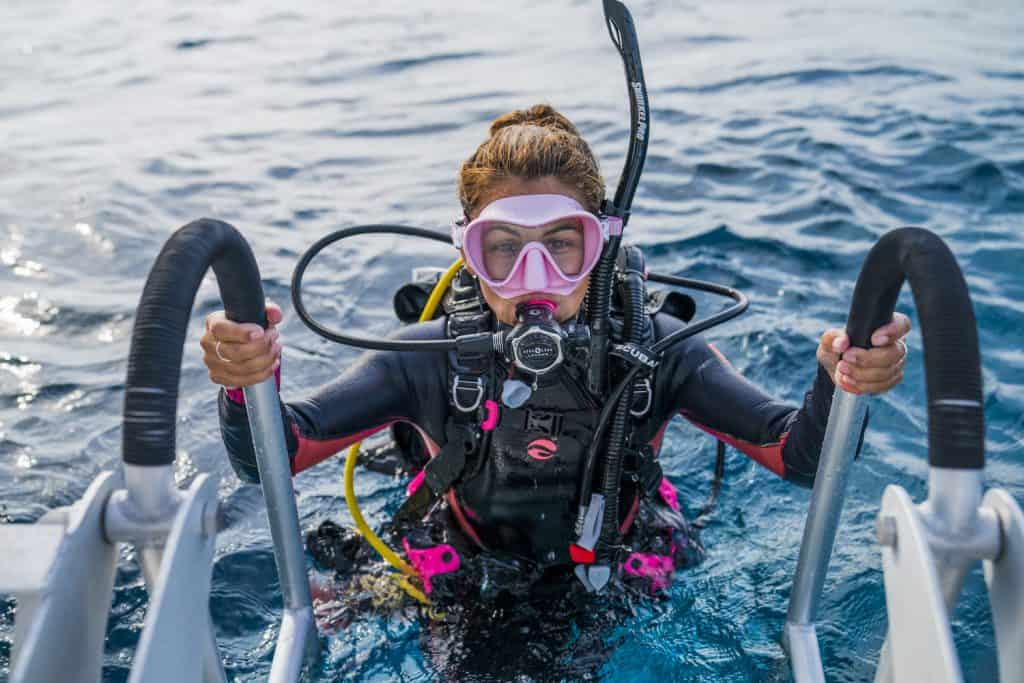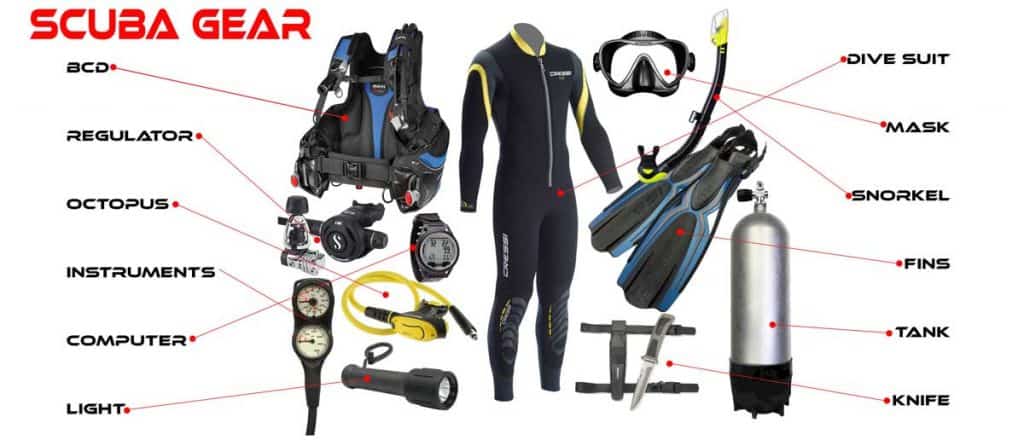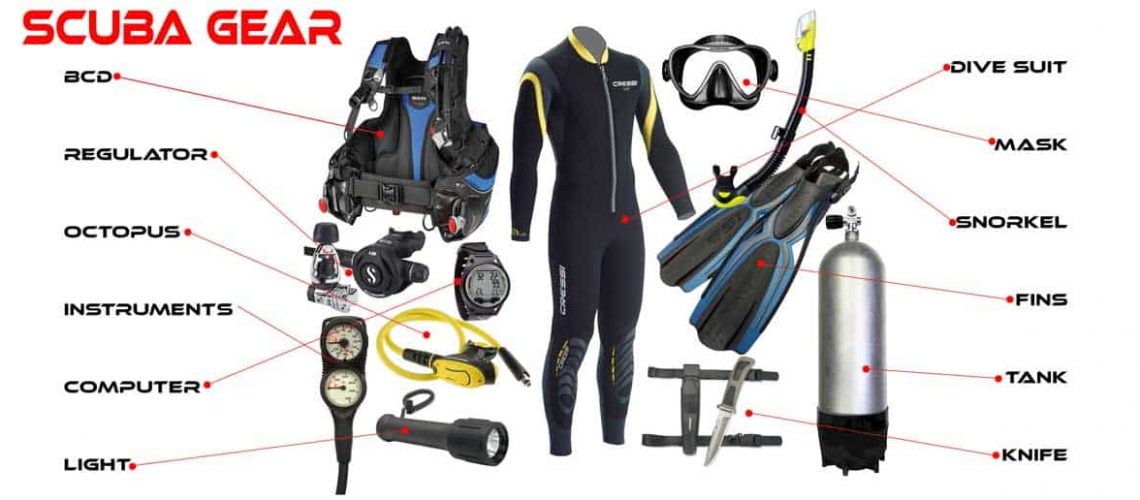OK, let’s talk about buying new scuba diving gear. Whether you are looking to buy your first set of scuba diving gear or just looking at upgrading your scuba equipment, it is a bit of a minefield with lots of conflicting opinions, so we have tried to create a fair unbiased guide here
“You should definitely buy the (insert piece of expensive shiny scuba diving gear here) I have, it’s the best there is!”
Mr A. Diver
I’m sure you heard that phrase on a dive boat, in fact, I’m sure you’ve heard it thousands of times before even outside of diving with cars, stereos, laptops etc. I’m a photographer outside of diving and if I had a Pound for every time I’ve heard that phrase with camera’s and diving equipment I’d have Jeff Bezos would be coming to me for a loan, but I digress.
The thing is these people are probably right, that piece of equipment is probably perfect…for them. People forget that when they are recommending equipment, that their research is biased toward them.
So here we have tried put together a guide to the benefits of owning your own scuba diving equipment, what to consider when you’re choosing gear, the importance of researching your purchases, and advice on trying before you buy.
Why buy my own Scuba Diving Gear?
Your instructor may have touched on the benefits of owning your equipment during you’re open water course, but I’m sure it went over your head, you’ve got far too much to think about. Hence why I tend not to talk about it to a student unless they broach the subject – as you’ve read this far I’ll assume you are broaching the subject.

First and foremost, having your own Scuba Diving Gear will be much more comfortable. Hands up who had a horrid mask on their open water? Well, there is nothing like doing your first dive in your own mask, that fits perfectly to your face and doesn’t leak constantly. As there’s that liberating feeling when you get your own BCD with integrated weights so you don’t have a heavy belt around your waist that always feels like it’s going to fall off.
Secondly, owning your own equipment makes you a much better diver in the long run. Familiarity with your setup helps result in more consistent buoyancy, which leads to more efficient fin kicking, which added together leads to better air consumption. Also, if you own your own gear you’ll go diving more. You’ll want to get your money’s worth (Yorkshireman in me speaking there!) and more diving equals more practice and what did your mum tell you practice makes? Perfect?
It cannot be denied there are fantastic benefits to owning your own scuba diving gear, but that’s not to say you should rush into purchasing everything at once. Good gear purchases come with a little bit of thought behind them.
What do you need to think about when buying scuba diving gear?
Suitability, Comfort and Fit, but you should all know that right? it’s an answer on your Open Water Course final exam. Remember these need to be considered together. That custom made drysuit, for example, you saw at the dive show might fit great, be really comfortable, but if you do 99% of your diving here with Dive Station Pattaya it’s entirely unsuitable. Budget is also important and I’ll touch on that later.
Is it suitable for your diving?
Suitability should be the first consideration when making any equipment decisions. Asking yourself a few questions you can establish whether your choices are right for you – both now and in the future. You need to consider what type of diving you will be doing most. Do you live in warm water dive resort like Pattaya? Or will you be travelling once or twice a year to get your diving fix? Or do you see yourself diving all year round in cold northern hemisphere waters?
Although I mentioned dry suits above, suitability doesn’t just apply to exposure suits. Suitability runs much deeper than that. Other questions you may want to ask yourself include:
Does my BCD have enough lift for the amount of weight I need?
Will my fins be suitable if I’m diving in strong current?
Is my equipment light enough to travel with?
Are the regulators environmentally sealed?
Scuba diving equipment is expensive, so you should build into your considerations future-proofing your purchases by considering how long it will be suitable for. When we start diving we do not know where this wonderful sport will take us, but you should think about whether your equipment can grow with you thus preventing it becoming redundant in a few years’ time. When I bought my first set of gear I bought a BCD & Regs that were great for travel…then soon became redundant as started diving most weekends in cold freshwater quarries in England and barrelling full speed ahead towards my divemaster course.
Does my Scuba Diving Gear fit properly?
I’m sure you have bought a pair of shoes that rub a little bit and thought you would break them in. We never compromise on the size with Scuba gear. Niggles from a BCD that’s too big or too small do not only spoil your enjoyment of dive but can impact on the safety of you and others – fiddling with ill-fitting gear distracts from important things, like checking your air.
Comfort goes hand-in-hand with a good fit, ask yourself once you know something is the right size, does it feel nice on? Can reach all the dumps on a BCD for example? Yes, the mask fits but do you prefer a black or clear skirt? Personally no matter how well-fitting a mask is if it’s got a black skirt I don’t feel comfortable in it. Yeah, I’m odd but remember, we are all different.
One final thing on comfort, if you are a female diver consider the female specific items – they are cut for the physiological differences in body shape.
Which Scuba Diving Equipment should I buy first?
If your numbers have just come up on the lottery them you’ll be purchasing a full set as soon as you collect that Open Water Certification Card, but realistically most of us can’t purchase a full kit the second we’ve passed our certification. With some equipment purchases it advisable to get a few dives under your belt first, such as your BCD, but others will instantly add value to your dives. I touched upon this in my guide to whether you need a Dive computer, but here are a few suggestions

Mask
Every diver has a mask horror story. Therefore without hesitation I say go buy a mask now- well, only if you haven’t already got one.
Compared to other equipment buys, choosing a great mask can be relatively simple. It’s THE easiest pieces gear to travel with – and it the most personal.
What to look for soft good quality silicone skirts! Come into the shop here in Pattaya and well help try on and talk you through the process (or your local dive store) you need to try on a variety of styles, manufactures to get the right fit. Something I’ve not mentioned before don’t get hooked up on a particular brand.
Dive Computer
I’ve written a whole blog about do I need a computer, well in 2020 and beyond if you are investing in scuba diving gear then the second purchase needs to be a computer. I’ll be highly surprised if you didn’t learn with one on your open water course and if you seriously haven’t used one before go to your local dive store and buy one anyway and ask the nice instructor in the shop how to use it. Computers are lifesaving equipment.
Purchasing a dive computer doesn’t have to be expensive; there are many entry-level models which are functional and affordable, and even the more wearable watch-style computers can be found at a reasonable price. Just like your mask, a computer is also a easy piece of gear to travel with – in fact if you have watch style one it even easier to travel with than your watch, it strapped to your wrist!
Fins and boots
These are something you should hold off on until you have a few dives under you belt. Here at Dive Station Pattaya we like Apek RK3’s, Scubapro Jet Fins and Scubapro Seawing Novas.
The Apeks are great fins a design that been around years as are the Jet fins. The Seawing nova are modern lightwieght fin which disceptively powerfull and perfect for traveling divers.
So again just do you research talk to us or you local dive store to understand the environments you’ll be diving in.
Regulators & BCD’s
This is where the expense starts to kick in, and this is where you need to start thinking about future proofing your purchase. Do your research carefully, consider you budget and the options you have in front of you.
Regulator is looked after can last if not a lifetime, they last a very long time so buy the best you can afford and if you can’t quite afford the ones that fit your future proofing plans hold off purchasing until you can.
BCD’s again when you have a few dives under your belt you should be considering this purchase, your instructor will be able to advise. Backplates & Wings are becoming more and more popular these days and are pretty future proof, but they are not for everyone. There are many recreational focused hybrid wings like the ScubaPro Hydro these retain lot of the traditional jacket style BCD which also remain very popular. Again you need to ask yourself what you need. If you are flight one a year to tropical dive destination you don’t need full on wing with a steel back plate – it’ll eat all you luggage allowance, perhaps look at the travel specific Hybrid wing which is available from many manufacturers.
Exposure Suit (wesuits)
Yes, I know they are clothing and yes people pee in them but realistically you’ll need different ones for different places. Here in Pattaya you’ll be find most of the year in rash vest and swimming togs, in the Maldives a 3mm shorty and Egypt a full length 5mm (even thicker at some times in the year)
So you need to purchase smart and if you’re a travelling diver one might not fit all situations hence why I personally put wetsuits low on my periority list, It’s something that eats into your budget.
Accessories
Dsmb, torches, reels, camera, reef hook the list is endless – and I’ve just listed he really useful ones. Be smart purchase as you find that need them not because you friend has one.
Your Homework today is?
So you’ve decided the items of gear you want to buy, now the teacher in comes out – you homework is research. Get on line look at manufactures websites and online reviews, and online diver forums.
Ask your diver friends what they have used, what they use now. Yes, I know I said at the beginning of this article what’s right for one isn’t necessary write for you but opinions are valuable when combined with your own reading.
If you have diver friend who’s the same size as you and has equipment you like the look of see if they’ll let you use it in pool session or a dive – you might need to buy them lunch, better to buy a burger than a really uncomfortable BCD!
Visit dive shops that stock a range of manufactures that way they will be less likely to be biased towards one manufacture when recommending equipment. Here at Dive Station Pattaya we can get out hands on most manufactures so we happy to give you our unbiased recommendations. We want happy returning clients and friends more than a fast sale.
What budget should you set?
How long is a piece of string? In reality, only you can decide that However, I would say do some research on prices first before you set a budget. When you have good idea of the type of equipment look at those prices with your available funds and look to purchase wisely. As I said above don’t let budget compromise your choices on things like Regulators, hold off on a wetsuit if it mean you can get a set of environmentally sealed regs against warm water only for example.
Above all stick to your budget remember you need funds to pay for the dive trips!
I hope you have found this guide helpful and informative, please do not hesitate to contact us here a Dive Station Pattaya either call in for a coffee or give us a call there’s nothing we like more than talking about scuba diving and scuba diving gear.



